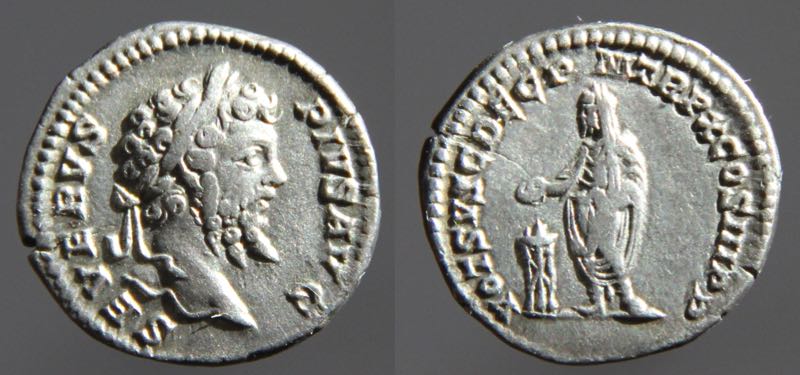
Roman VOTA coins of the third century
Here is a selection of vota coins from the third century, in chronological order. Some of the information is repeated from the main page or other pages.
What's new? 2022, June 13: Cararcalla Suscepta, Caracalla Soluta.

Septimius Severus, 193-211.
This is the only explicitly dated VOTA type of Septimius Severus. It has legend
VOT SVSC DEC PM TRP X COS III PP.
The "TRP X" allows us to date it to his tenth TRP year, 202.
Although the office of the tribune and thus the title TRP on coins changed December 10 in the early empire, under Septimius Severus it coincided with calendar years and he took TRP at the beginning of his reign, so (unlike Antoninus Pius) his regnal years are exactly the corresponding TRP years. TRP II began on January 1, 194. That makes TRP X begin on January 1, 202. (Also, he became "COS III" at the beginning of 202 and never was COS IIII.)
RIC 172. BMC 388. Sear II 6391. Struck AD 202.
So, how can this coin have "VOT SVSC X"? "Vota suscepta X". So this coin appears to be issued during the tenth year, not after the tenth year was completed. If it anticipates ten years being completed, wouldn't the ceremony be for vows soluta? Isn't the tenth year late to be mentioning vows taken (suscepta) for ten years? Is the depicted ceremony referring to the tenth year (about to be) completed and simultaneously vows renewed (suscepta) for more years, presumably twenty? Maybe vows for the tenth year were at the beginning of the regnal year and this coin suggests the year-10 vows were completed and new vows were suscepta for another ten. Maybe "DEC" refers to the next ten, not the completed ten.
On the second-century page there is a coin of Antoninus Pius issued with TRP XI whereas the one above has TRP X and "SVSC".
The following coin in the name of Caracalla was issued at the same time as the above coin of Septimius Severus.
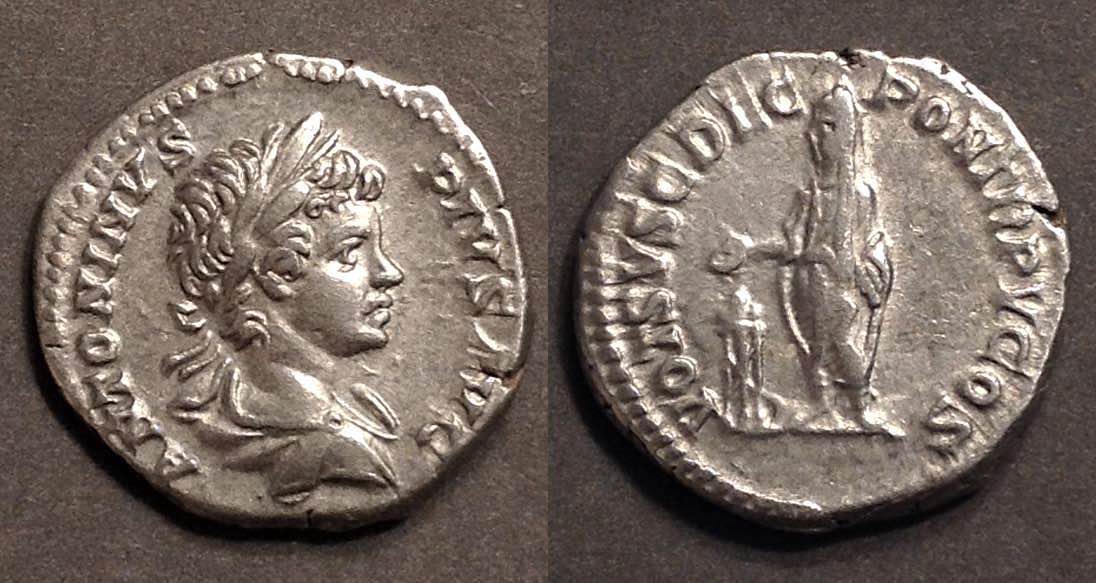 Caracalla, Augustus 198-217
Caracalla, Augustus 198-217
Denarius, 3.54 grams and 18 mm.
Struck 202 (TRP V)
ANTONINVS PIVS AVG, a common obverse legend for him.
VOT SVSC DEC PON TRP V COS
"Vows taken for 10 years Pontifex (priest) Power of the Tribune for the fifth time, Consul"
Emperor, togate, sacrificing over tripod altar.
RIC 68. BMC 397. Sear II 6908.
Most vows taken for ten years are taken at the beginning of the reign, not five years later. Many coins look forward to 10-year celebrations, but mention of 5-year celebrations on coins is rare until the fourth century, even though there probably were 5-year celebrations in earlier centuries that were not mentioned on coins. This year, 202, was the occasion for 10-year celebrations of Septimius Severus, so it is possible that the occasion would prompt vows for Caracalla as well, and what number vows would they be? Caracalla was in his year 5, so his vows would be for 10 years, as on this coin. We might wonder if the vows were really vows of Severus for whom Caracalla's TRP V is Septimius's TRP X. In fact, the previous coin, of Septimius, does have a very similar coin with much the same legend, however with titles appropriate for Septimius:
VOT SVSC DEC P M TRP X COS III PP (RIC 186, BMC 232, Sear II 6391).
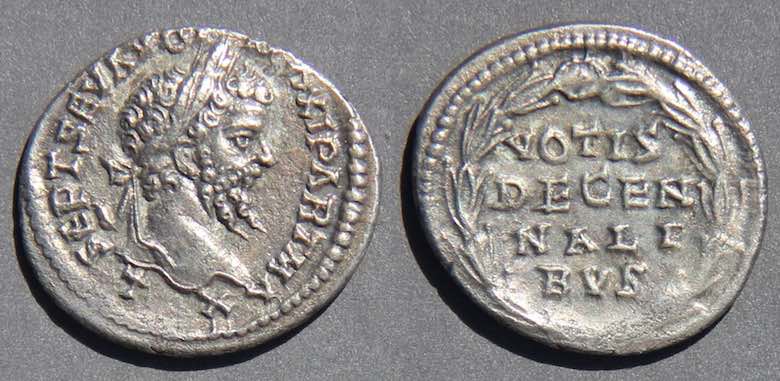 Septimius Severus, 193-211.
Septimius Severus, 193-211.
SEPT SEV AVG IMP XI PART MAX, laureate head right
VOTIS/DECEN/NALI/BVS in wreath
Denarius. 19-18 mm.
Sear 6396. RIC 520a. BMC 681 "Eastern mint, 198-202"
Year 11 suggests the coin commemorates the 10-year festival after its completion.
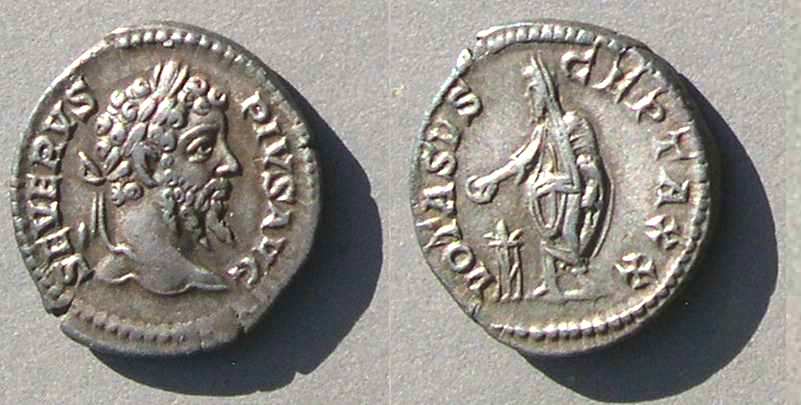 [Repeated from the main page]
[Repeated from the main page]
Septimius Severus (AD 193-211).
Denarius. 19 mm.
VOTA SVSCEPTA XX, the emperor veiled and draped as a priest sacrificing, pouring from a patera over a flaming altar, with legend
RIC 308 "202-210". Sear 6393. BMC 375 "201-210".
Vows taken for 20 would occur when the vows for 10 were paid. More coins mention vows taken than mention vows paid.
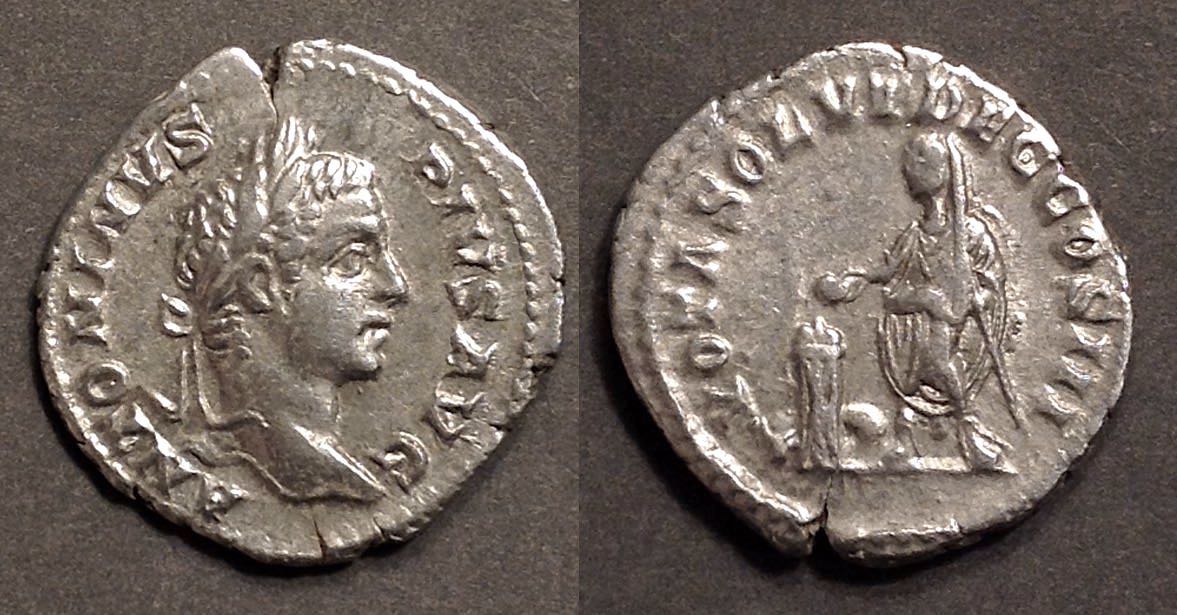 Caracalla, Augustus 198-217.
Caracalla, Augustus 198-217.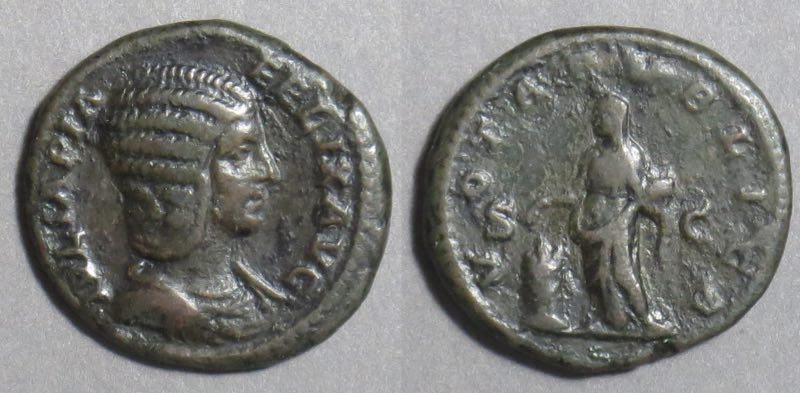 Julia Domna, wife of Septimius Severus
Julia Domna, wife of Septimius Severus
26-25 mm. An as.
VOTA PVBLICA around
Julia Domna, as Pietas, sacrificing at altar
S C either side
RIC 608 "S, c. 211-217"
Sear II 7138 "Rome, 211"
Hill "211"
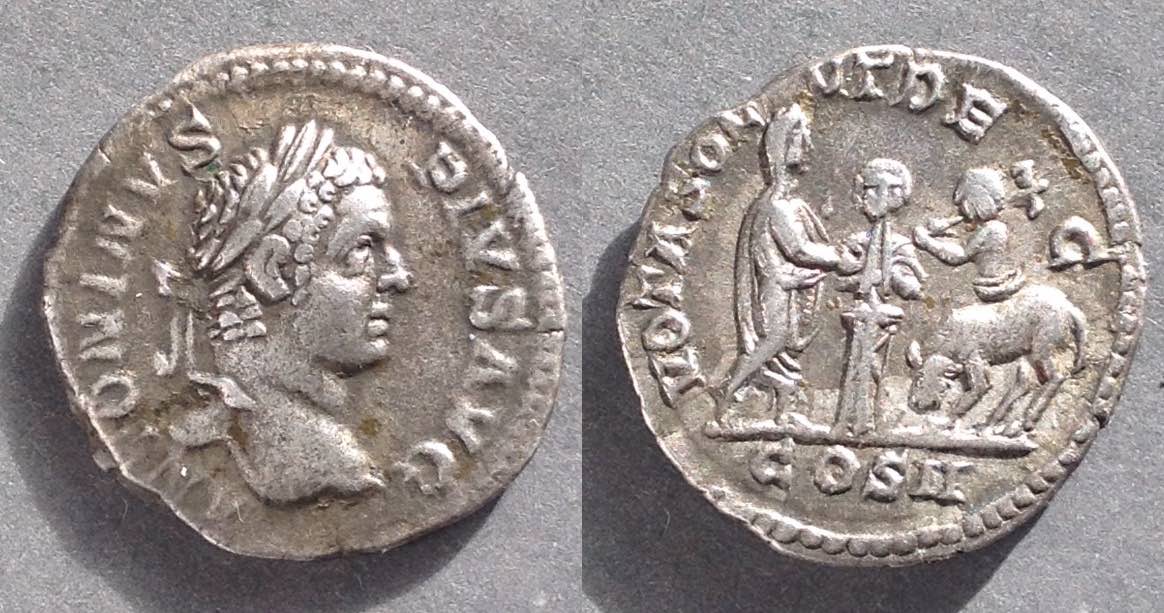
[Repeated from the main page]
Caracalla, struck c. 207 AD.
VOTA SOLVT DEC (vows for ten years fullfilled) with COS II in exergue.
Caracalla standing right holding patera over tripod altar, flute (with two pipes) player facing behind the tripod altar, a sacrificial bull about to be slain by a victimarius with raised ax. A scene with action!
Of all the VOTA types, this is the only one to show this much of the ceremony.
Sear II 6907 variety (Sear's has COS III).
RIC Caracalla 204 (COS II) page 240 "Scarce, 209-212" which must be wrong on both counts. (It is very rare and not later than 207.) Hill 946 is COS III "R4" (0 or 1 in all the hoards he studied) and COS II is omitted, so it must be very rare, both as a type and as COS II. He was made Caesar in 196 and promoted to Augustus in 198 by his father, Septimius Severus. He became COS II in 205 and became COS III in 208.
Caracalla issued in 217 several vota types for year XX that commemorate his Parthian victory. He became Augustus in 198, possibly early in the year, so 217 was regnal year 20, his last year.
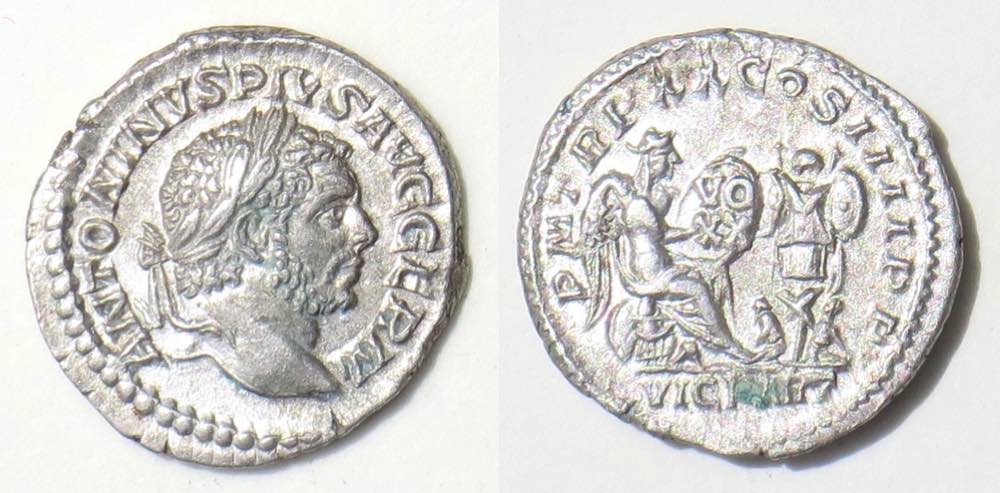 Caracalla, 196-198, 217
Caracalla, 196-198, 217
Denarius. 19 mm.
Victory seated, holding shield inscribed
VO/XX
trophy before with two captives at feet
PM TRP XX COS IIII PP
Dated to 217, his 20th regnal year (as Augustus)
RIC 297e "S, 217"
Hill 1601 "R3" (very rare in hoards)
Sear II 6892
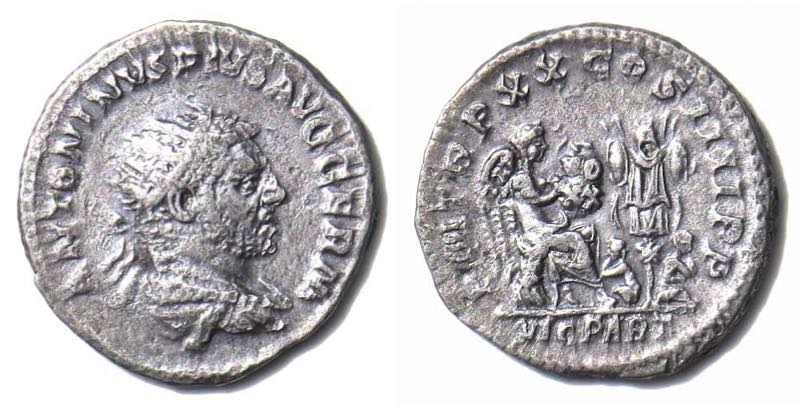
Caracalla
as above, but an antoninianius.
Antoninianus. 22 mm.
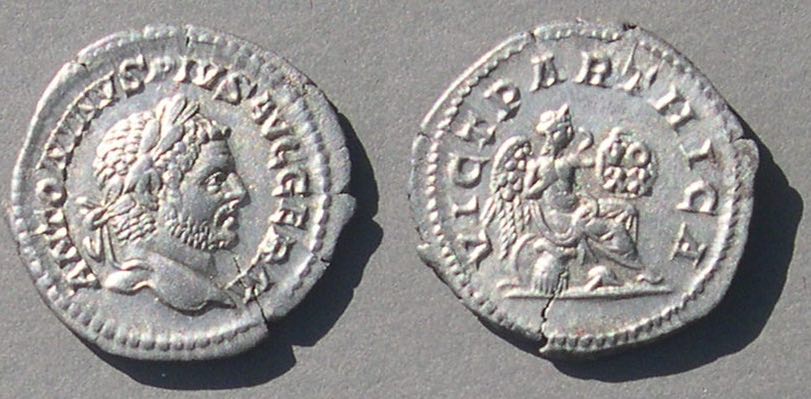 Caracalla
Caracalla
Denarius. 19 mm.
VICT PARTHICA around
Victory seated right holding shield with
VO/XX
Struck 217
RIC 314a
Hill 1603 "R3" (very rare in hoards)
Sear II 6896
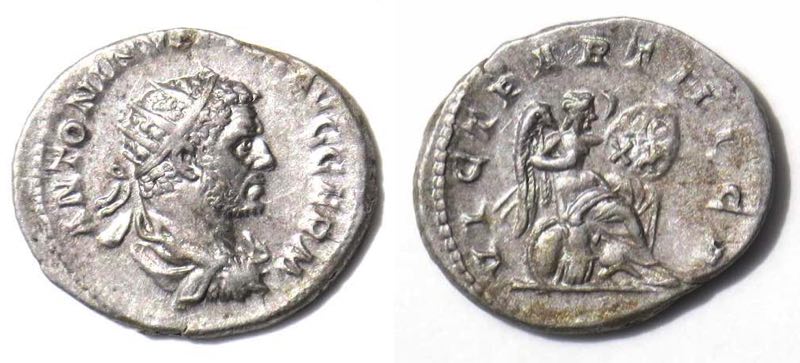
Caracalla
as above, but an antoninianius.
Antoninianus. 23-20 mm.
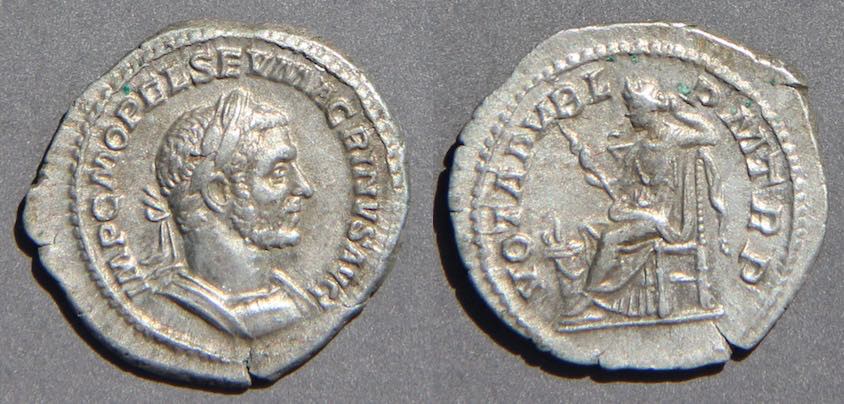 Macrinus, April 11, 217- June 8, 218
Macrinus, April 11, 217- June 8, 218
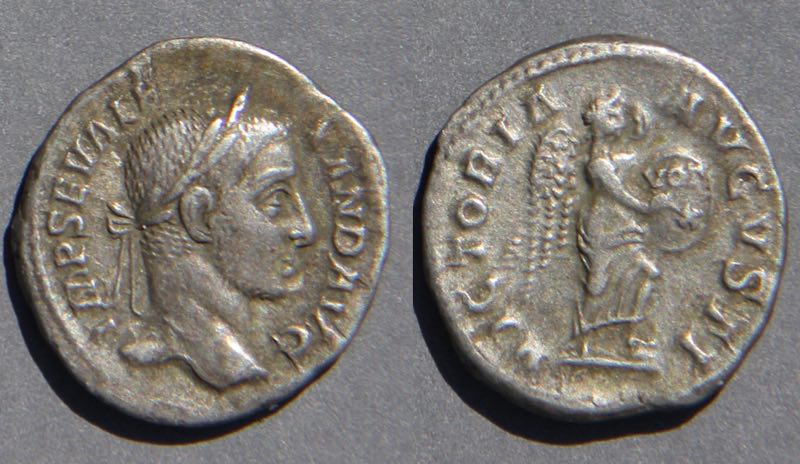 Severus Alexander, 222-235
Severus Alexander, 222-235
19 mm. 3.08 grams.
Stuck 231 at Rome
VICTORIA AVGVSTI
Victory right inscribing shield VOT X
her foot on a helmet
Sear 7932 "230, Rome". RIC 219 "Scarce, 228-231."
BMC 638 "issue 11, AD 230"
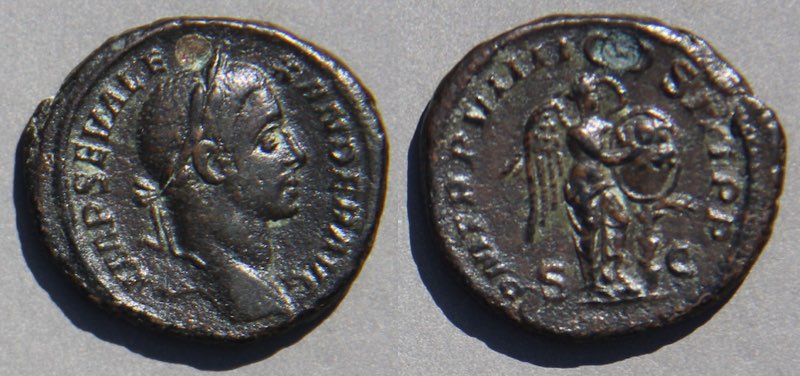 [Repeated from the main page]
[Repeated from the main page]
Vows are sometimes recorded by a single Victory inscribing a shield.
An as of Severus Alexander (222-235). 26-24 mm. (Holed and plugged at 12:00.)
IMP SEV ALEXANDER AVG
PM TRP VIIII COS III PP
Victory inscribing VOT X on a shield.
TRP VIIII shows this coin was struck in regnal year 9 (230), not year 10, but the situation is confused by his having been appointed Caesar in 221, the year before he became Augustus. Maybe the vows mentioned were vows taken when he became Caesar.
[Repeated from the main page]
IMP MAXIMINVS PIVS AVG
VOTIS/DECENNA/LIBVS (vows for ten years) in a wreath.
20-19 mm. RIC 17 (Rome mint). Sear 8319. BMC 39. Reka Devnia: Among 1721 coins of Maximian only 1 was of this type.
These vows for ten years must be suscepta because he did not last enough for them to be soluta.
This denarius of Maximinus Thrax (235-238), the Giant, was one of his first issues, probably within a few months of becoming emperor. We can date it by its "early" portrait which resembles that of the previous emperor, Severus Alexander. That portrait was soon superseded when Rome learned more about what he actually looked like. (For the dating of this early style, see Maximinus Thrax, the Giant.)
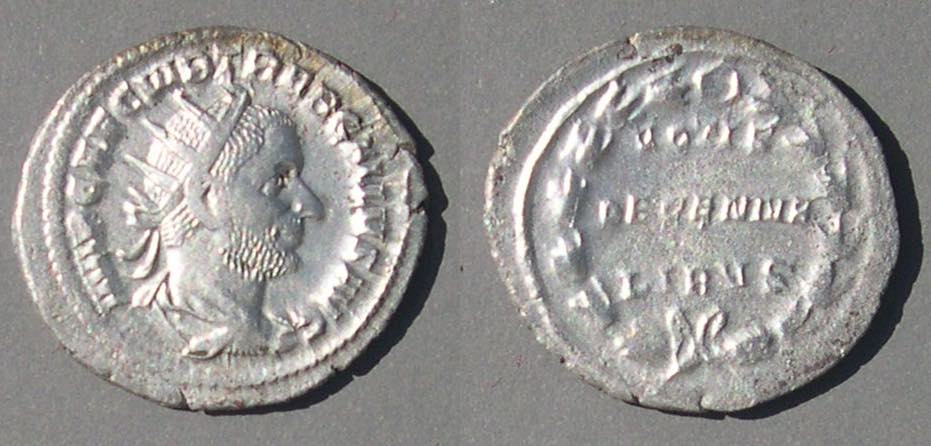 Trebonianus Gallus, 251-253.
Trebonianus Gallus, 251-253.
24-22 mm.
IMP CAE C VIB TREB GALLVS AVG
VOTIS/DECENNA/LIBIS in wreath
Sear III 9659 "251". RIC 49 "R2" plate 13.14 same reverse die.
Very rare.
Once again we see a 10-year type that must have been issued at the beginning of the reign.
Vota coins with numbered years are rare from the middle of the third century until the first tetrarchy. The next vota coin is not numbered and the coins following it are rare.
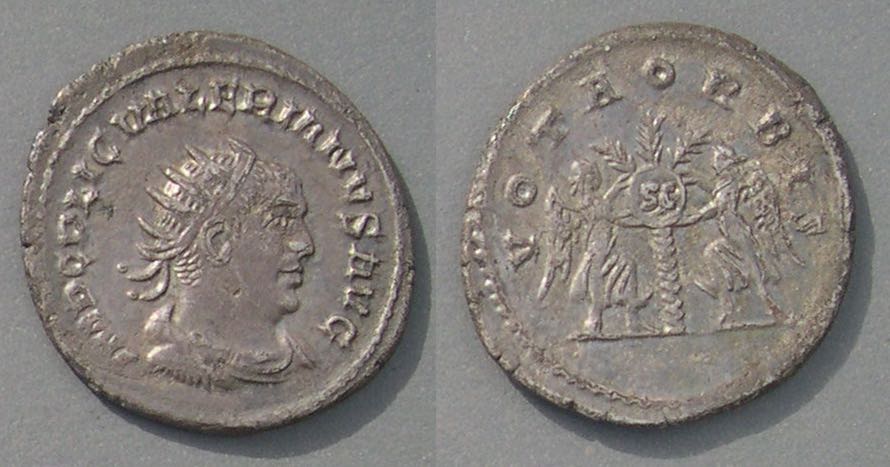 Valerian, 253-260
Valerian, 253-260
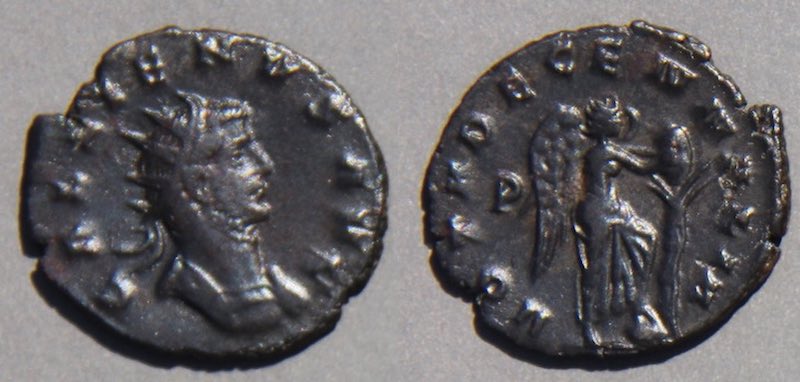 [Repeated from the main page]
[Repeated from the main page]
Gallienus. 253-268.
22-21 mm. e
GALLIENVS AVG
VOTA DECENNALIA around
Victory inscribing shield on palm tree, P in field left
RIC V.I 540 Struck 262-263 at Mediolanum
Very rare.
Cunetio 1352-4 had 11 examples with this legend, none with the "P", among 14,429 coins of Gallienus and Salonina
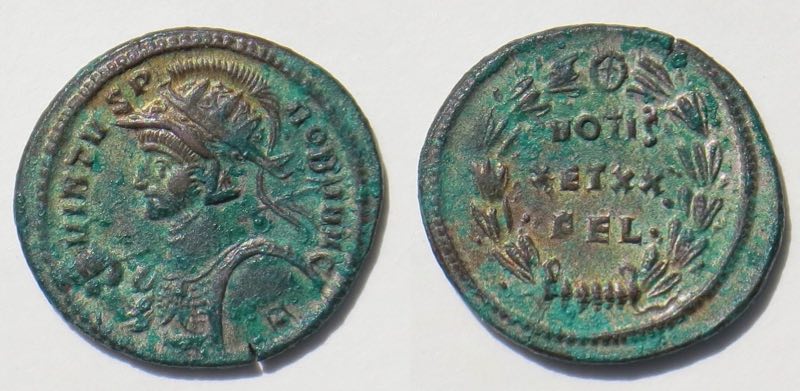 [Repeated from the main page]
[Repeated from the main page]Probus, 276-282
22-21 mm. 4.09 grams.
VIRTVS PROBI AVG, helmeted bust left with spear and shield
VOTIS/X ET XX/FEL in wreath
Sear III 12077, "AD 277".
RIC V.II 459 "Ticinum, 277." "R2." Very rare.
Go to the page on vota types of the tetrarchies.
Return to the main page on vota types.
Leave the pages of vota types and go to the main Table of Contents page for this educational site.